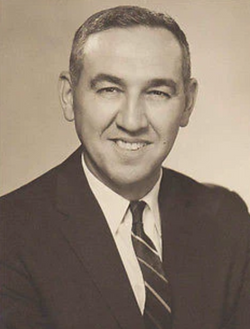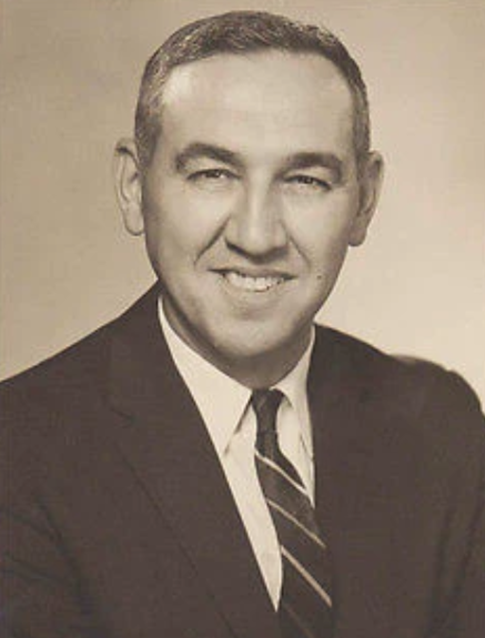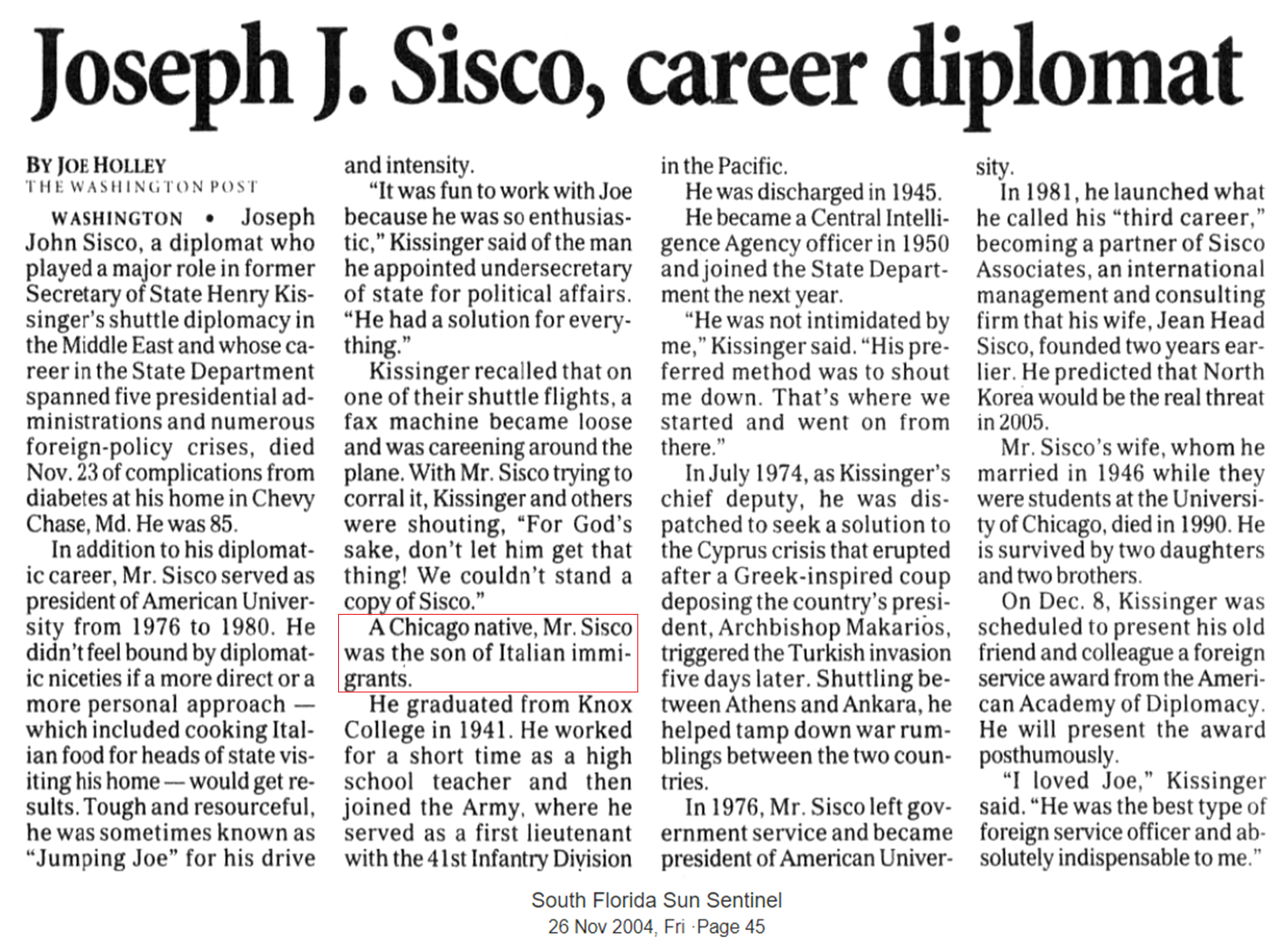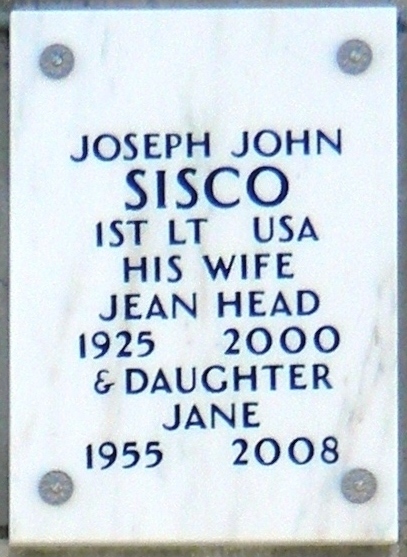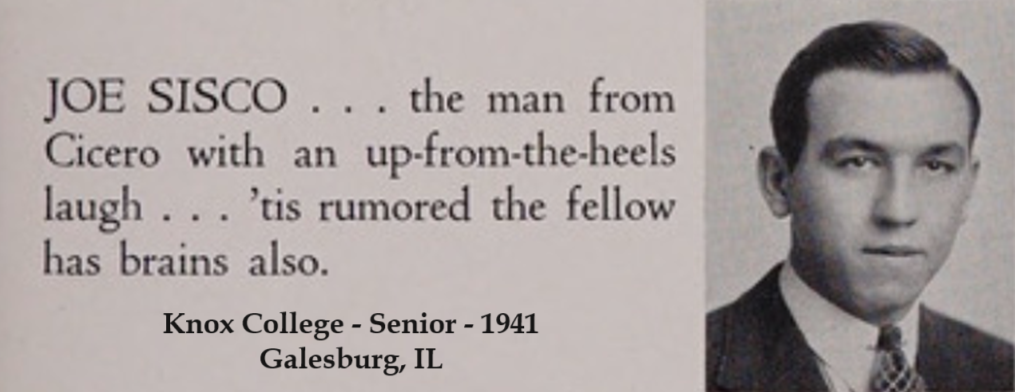Son of Southern Italian Immigrants - Longtime Diplomat & Asst Secretary of State
Diplomat Joseph J. Sisco Dies at 85
Joseph John Sisco, 85, a diplomat who played a major role in then-Secretary of State Henry Kissinger's shuttle diplomacy in the Middle East and whose career in the State Department spanned five presidential administrations and numerous foreign-policy crises, died Nov. 23 of complications from diabetes at his home in Chevy Chase.
In addition to his diplomatic career, Dr. Sisco served as president of American University from 1976 to 1980. He became a university president, he said, because he came from an impoverished background and wanted to acknowledge all that education had done for him.
As a State Department negotiator, Dr. Sisco was involved in diplomatic hot spots that included Syria's invasion of Jordan in 1970, the India-Pakistan war in 1971, and Egypt and Israel's peace negotiations in 1974.
He didn't feel bound by diplomatic niceties if a more direct or a more personal approach -- which included cooking Italian food for heads of state visiting his home -- would get results. Tough and resourceful, he was sometimes known as "Jumping Joe" for his drive and intensity.
"It was fun to work with Joe because he was so enthusiastic," Kissinger said of the man he appointed undersecretary of state for political affairs. "He had a solution for everything."
Kissinger recalled that on one of their shuttle flights, a fax machine became loose and was careering around the plane. With Dr. Sisco trying to corral it, Kissinger and others were shouting, "For God's sake, don't let him get that thing! We couldn't stand a copy of Sisco."
Writing about a Mideast cease-fire in the summer of 1970, columnist Joseph Kraft noted that credit was widespread, but "by far the most important contribution was made by Assistant Secretary of State Joseph Sisco, an outspoken, candid man, rough in manner and more interested in tactics than strategy who possesses in abundance the quality Talleyrand said diplomats should renounce -- zeal."
A Chicago native, Dr. Sisco was the son of Italian immigrants. His mother died when he was 9, and his father, a tailor, raised the five Sisco children in modest circumstances.
He graduated from high school in 1937, briefly attended junior college and then transferred to Knox College in Galesburg, Ill. He graduated magna cum laude and Phi Beta Kappa in 1941. He worked for a short time as a high school teacher and then joined the Army, where he served as a first lieutenant with the 41st Infantry Division in the Pacific. He was discharged in 1945.
At the University of Chicago, he received a master's degree in 1947 and a doctorate in 1950, specializing in Soviet affairs. He also played basketball as a scrappy 6-foot-1 center on the college's last Big 10 team.
He expected to pursue an academic career but felt he needed government experience before teaching and writing about international relations. He became a Central Intelligence Agency officer in 1950 and joined the State Department the next year.
From 1951 to 1965, he served as a foreign affairs officer, specializing in issues involving the United Nations and other international organizations. In 1965, Secretary of State Dean Rusk appointed Dr. Sisco assistant secretary of state for international organization affairs.
His deep involvement in Middle East diplomacy began at about the time Arthur J. Goldberg succeeded Adlai Stevenson as ambassador to the United Nations. Because Rusk was devoting much of his time to Vietnam, Goldberg was, in essence, in charge of U.S. policy in the Middle East during and after the Six-Day War in June 1967. Dr. Sisco worked closely with Goldberg until the U.N. ambassador left government service in the spring of 1968. Dr. Sisco became the chief U.S. mediator in the Middle East.
On Jan. 30, 1969, President Richard Nixon appointed him assistant secretary of state for Near Eastern and South Asian affairs. Later that year, his policy paper on the Middle East became the basis for the president's Middle East policy.
As Marvin and Bernard Kalb explained in their book "Kissinger," Dr. Sisco's strategy involved containing the Soviet Union's growing influence in the Middle East, convincing the Arab states that the Nixon administration was being evenhanded and coaxing Israel to withdraw from occupied Arab territory.
Although the approach did not work as planned, it eventually led to a fragile cease-fire along the Suez Canal, beginning on Aug. 7, 1970, with Jordan, Egypt and Israel agreeing to stop shooting.
It also led to what the Kalbs called "an outbreak of temper and tension between Dr. Sisco and Kissinger" when Kissinger sought to intervene at the last minute.
"He was not intimidated by me," Kissinger said. "His preferred method was to shout me down. That's where we started and went on from there."
In July 1974, as Kissinger's chief deputy, he was dispatched to seek a solution to the Cyprus crisis that erupted after a Greek-inspired coup deposing the country's president, Archbishop Makarios, triggered a Turkish invasion five days later. Shuttling between Athens and Ankara, he helped tamp down war rumblings between the two countries.
"There is little doubt Greece would have responded to Turkey's invasion of Cyprus with its own invasion of Turkey were it not for Undersecretary of State Joseph Sisco's backstage pressure in Athens," columnists Rowland Evans and Robert Novak wrote on July 25, 1974. "In most undiplomatic language, Sisco told the Greek generals that the U.S. would abandon them to inevitable destruction if they attacked Turkey. Jolted by this unexpected threat, the military dictatorship backed down and thereby guaranteed its own fall on Tuesday."
In 1976, Dr. Sisco left government service and became president of American University. During his time there, he worked to elevate undergraduate admission standards and oversaw the construction of a long-delayed library and athletics arena, but it was not a particularly happy phase of his professional life.
Trustees and faculty members questioned the amount of time he spent on AU affairs, as well as his lucrative speaking fees and board memberships. He resigned in 1980, saying he was "absolutely fed up with fundraising."
In 1981, he launched what he called his "third career," becoming a partner of Sisco Associates, an international management and consulting firm that his wife, Jean Head Sisco, founded two years earlier.
Dr. Sisco specialized in political and economic risk analysis for U.S. and foreign companies. He also wrote op-ed pieces and journal articles, made TV appearances and lectured. He continued to speak out on foreign policy issues until a few weeks ago.
In June, in an appearance on "The NewsHour With Jim Lehrer," he defended the Bush administration's conduct of foreign affairs, including the invasion of Iraq, at a time when a bipartisan group of 27 retired Foreign Service officers was calling for President Bush's defeat.
He conceded that the administration had made mistakes but insisted that it was moving in the right direction in Iraq, however costly and painful. He predicted that North Korea would be the real threat in 2005.
Dr. Sisco's wife, whom he married in 1946 while they were students at the University of Chicago, died in 1990.
Survivors include two daughters, Carol Bolton Sisco of Riva and Jane Murdock Sisco of Bethesda; and two brothers, Paul Sisco of Bethesda and George Sisco of Broadview, Ill.
On Dec. 8, Kissinger was scheduled to present his old friend and colleague a foreign service award from the American Academy of Diplomacy. He will present the award posthumously.
"I loved Joe," Kissinger said. "He was the best type of Foreign Service officer and absolutely indispensable to me."
Dr. Joseph Sisco was involved in diplomatic issues including Syria's invasion of Jordan in 1970 and the Mideast peace talks in 1974.
Credit: By Joe Holley, Washington Post, November 24, 2004
**
According to Wikipedia, Sisco also spent one year as a CIA Officer before joining the State Department.
Additionally, two of his brothers, Augustino "August" Carmin Sisco & Paul Carmin Sisco, went on to have prestigious careers with the press.
After WWII his brother, August Carmen Sisco, a USN veteran, was asked by the Navy to train Navy journalists. He went on to have a storied career as the City Editor for the Chicago Sun Times.
The other brother, Paul Carmen Sisco, was a Chicago UPI Sports writer, who by 1963 had risen to Chicago UPI Film News Bureau Chief, and by 1973 was the UPI's Washington Bureau Chief of the UPI Film Divisions. The afternoon of 11/22/63, immediately following the assassination of President Kennedy, UPI flew him out of Chicago to Dallas, to cover the JFK Assassination, along with Chicago UPI sound engineer Oliver Oakes, and a young recently hired UPI Cameraman, Isadore "Izzy" Bleckman.
Two days later Sisco and Bleckman were filming the transfer of the alleged assassin, Lee Harvey Oswald, in the DPD basement, when they became very close eyewitnesses to his assassination by Jack Ruby. Bleckman went on to have a now legendary career with UPI, and then with CBS as the beloved cameraman for "On the Road with Charles Kuralt" and "Sunday Morning"; and Sisco rose to become UPI Washington Bureau Chief of the Film Division. I have recently identified them in a photo by Dallas Morning News Chief Photographer, Jack Beers, next to each other in the aftermath of the shooting of Oswald.
Rest in Peace...
~Linda (48291572)
Son of Southern Italian Immigrants - Longtime Diplomat & Asst Secretary of State
Diplomat Joseph J. Sisco Dies at 85
Joseph John Sisco, 85, a diplomat who played a major role in then-Secretary of State Henry Kissinger's shuttle diplomacy in the Middle East and whose career in the State Department spanned five presidential administrations and numerous foreign-policy crises, died Nov. 23 of complications from diabetes at his home in Chevy Chase.
In addition to his diplomatic career, Dr. Sisco served as president of American University from 1976 to 1980. He became a university president, he said, because he came from an impoverished background and wanted to acknowledge all that education had done for him.
As a State Department negotiator, Dr. Sisco was involved in diplomatic hot spots that included Syria's invasion of Jordan in 1970, the India-Pakistan war in 1971, and Egypt and Israel's peace negotiations in 1974.
He didn't feel bound by diplomatic niceties if a more direct or a more personal approach -- which included cooking Italian food for heads of state visiting his home -- would get results. Tough and resourceful, he was sometimes known as "Jumping Joe" for his drive and intensity.
"It was fun to work with Joe because he was so enthusiastic," Kissinger said of the man he appointed undersecretary of state for political affairs. "He had a solution for everything."
Kissinger recalled that on one of their shuttle flights, a fax machine became loose and was careering around the plane. With Dr. Sisco trying to corral it, Kissinger and others were shouting, "For God's sake, don't let him get that thing! We couldn't stand a copy of Sisco."
Writing about a Mideast cease-fire in the summer of 1970, columnist Joseph Kraft noted that credit was widespread, but "by far the most important contribution was made by Assistant Secretary of State Joseph Sisco, an outspoken, candid man, rough in manner and more interested in tactics than strategy who possesses in abundance the quality Talleyrand said diplomats should renounce -- zeal."
A Chicago native, Dr. Sisco was the son of Italian immigrants. His mother died when he was 9, and his father, a tailor, raised the five Sisco children in modest circumstances.
He graduated from high school in 1937, briefly attended junior college and then transferred to Knox College in Galesburg, Ill. He graduated magna cum laude and Phi Beta Kappa in 1941. He worked for a short time as a high school teacher and then joined the Army, where he served as a first lieutenant with the 41st Infantry Division in the Pacific. He was discharged in 1945.
At the University of Chicago, he received a master's degree in 1947 and a doctorate in 1950, specializing in Soviet affairs. He also played basketball as a scrappy 6-foot-1 center on the college's last Big 10 team.
He expected to pursue an academic career but felt he needed government experience before teaching and writing about international relations. He became a Central Intelligence Agency officer in 1950 and joined the State Department the next year.
From 1951 to 1965, he served as a foreign affairs officer, specializing in issues involving the United Nations and other international organizations. In 1965, Secretary of State Dean Rusk appointed Dr. Sisco assistant secretary of state for international organization affairs.
His deep involvement in Middle East diplomacy began at about the time Arthur J. Goldberg succeeded Adlai Stevenson as ambassador to the United Nations. Because Rusk was devoting much of his time to Vietnam, Goldberg was, in essence, in charge of U.S. policy in the Middle East during and after the Six-Day War in June 1967. Dr. Sisco worked closely with Goldberg until the U.N. ambassador left government service in the spring of 1968. Dr. Sisco became the chief U.S. mediator in the Middle East.
On Jan. 30, 1969, President Richard Nixon appointed him assistant secretary of state for Near Eastern and South Asian affairs. Later that year, his policy paper on the Middle East became the basis for the president's Middle East policy.
As Marvin and Bernard Kalb explained in their book "Kissinger," Dr. Sisco's strategy involved containing the Soviet Union's growing influence in the Middle East, convincing the Arab states that the Nixon administration was being evenhanded and coaxing Israel to withdraw from occupied Arab territory.
Although the approach did not work as planned, it eventually led to a fragile cease-fire along the Suez Canal, beginning on Aug. 7, 1970, with Jordan, Egypt and Israel agreeing to stop shooting.
It also led to what the Kalbs called "an outbreak of temper and tension between Dr. Sisco and Kissinger" when Kissinger sought to intervene at the last minute.
"He was not intimidated by me," Kissinger said. "His preferred method was to shout me down. That's where we started and went on from there."
In July 1974, as Kissinger's chief deputy, he was dispatched to seek a solution to the Cyprus crisis that erupted after a Greek-inspired coup deposing the country's president, Archbishop Makarios, triggered a Turkish invasion five days later. Shuttling between Athens and Ankara, he helped tamp down war rumblings between the two countries.
"There is little doubt Greece would have responded to Turkey's invasion of Cyprus with its own invasion of Turkey were it not for Undersecretary of State Joseph Sisco's backstage pressure in Athens," columnists Rowland Evans and Robert Novak wrote on July 25, 1974. "In most undiplomatic language, Sisco told the Greek generals that the U.S. would abandon them to inevitable destruction if they attacked Turkey. Jolted by this unexpected threat, the military dictatorship backed down and thereby guaranteed its own fall on Tuesday."
In 1976, Dr. Sisco left government service and became president of American University. During his time there, he worked to elevate undergraduate admission standards and oversaw the construction of a long-delayed library and athletics arena, but it was not a particularly happy phase of his professional life.
Trustees and faculty members questioned the amount of time he spent on AU affairs, as well as his lucrative speaking fees and board memberships. He resigned in 1980, saying he was "absolutely fed up with fundraising."
In 1981, he launched what he called his "third career," becoming a partner of Sisco Associates, an international management and consulting firm that his wife, Jean Head Sisco, founded two years earlier.
Dr. Sisco specialized in political and economic risk analysis for U.S. and foreign companies. He also wrote op-ed pieces and journal articles, made TV appearances and lectured. He continued to speak out on foreign policy issues until a few weeks ago.
In June, in an appearance on "The NewsHour With Jim Lehrer," he defended the Bush administration's conduct of foreign affairs, including the invasion of Iraq, at a time when a bipartisan group of 27 retired Foreign Service officers was calling for President Bush's defeat.
He conceded that the administration had made mistakes but insisted that it was moving in the right direction in Iraq, however costly and painful. He predicted that North Korea would be the real threat in 2005.
Dr. Sisco's wife, whom he married in 1946 while they were students at the University of Chicago, died in 1990.
Survivors include two daughters, Carol Bolton Sisco of Riva and Jane Murdock Sisco of Bethesda; and two brothers, Paul Sisco of Bethesda and George Sisco of Broadview, Ill.
On Dec. 8, Kissinger was scheduled to present his old friend and colleague a foreign service award from the American Academy of Diplomacy. He will present the award posthumously.
"I loved Joe," Kissinger said. "He was the best type of Foreign Service officer and absolutely indispensable to me."
Dr. Joseph Sisco was involved in diplomatic issues including Syria's invasion of Jordan in 1970 and the Mideast peace talks in 1974.
Credit: By Joe Holley, Washington Post, November 24, 2004
**
According to Wikipedia, Sisco also spent one year as a CIA Officer before joining the State Department.
Additionally, two of his brothers, Augustino "August" Carmin Sisco & Paul Carmin Sisco, went on to have prestigious careers with the press.
After WWII his brother, August Carmen Sisco, a USN veteran, was asked by the Navy to train Navy journalists. He went on to have a storied career as the City Editor for the Chicago Sun Times.
The other brother, Paul Carmen Sisco, was a Chicago UPI Sports writer, who by 1963 had risen to Chicago UPI Film News Bureau Chief, and by 1973 was the UPI's Washington Bureau Chief of the UPI Film Divisions. The afternoon of 11/22/63, immediately following the assassination of President Kennedy, UPI flew him out of Chicago to Dallas, to cover the JFK Assassination, along with Chicago UPI sound engineer Oliver Oakes, and a young recently hired UPI Cameraman, Isadore "Izzy" Bleckman.
Two days later Sisco and Bleckman were filming the transfer of the alleged assassin, Lee Harvey Oswald, in the DPD basement, when they became very close eyewitnesses to his assassination by Jack Ruby. Bleckman went on to have a now legendary career with UPI, and then with CBS as the beloved cameraman for "On the Road with Charles Kuralt" and "Sunday Morning"; and Sisco rose to become UPI Washington Bureau Chief of the Film Division. I have recently identified them in a photo by Dallas Morning News Chief Photographer, Jack Beers, next to each other in the aftermath of the shooting of Oswald.
Rest in Peace...
~Linda (48291572)
Inscription
1ST LT US ARMY
Family Members
Sponsored by Ancestry
Advertisement
Records on Ancestry
Advertisement
